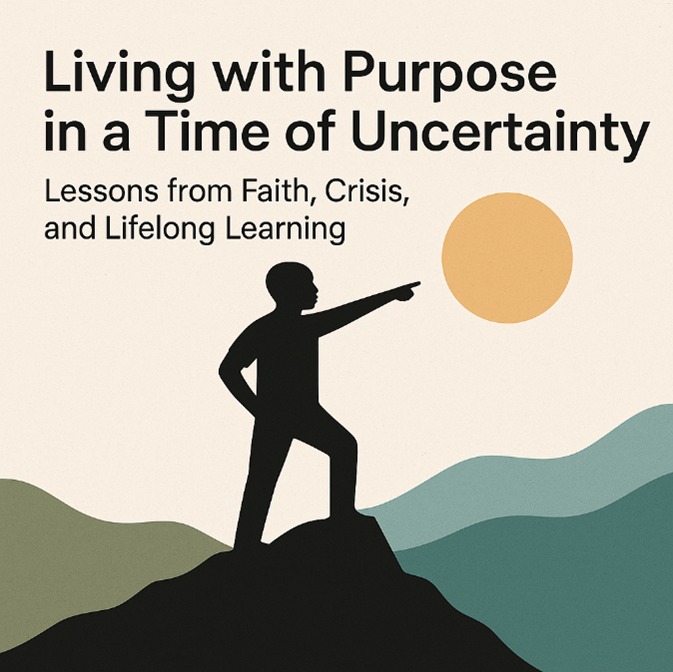By Dr. Joshua Wathanga
When the COVID-19 pandemic struck, many of us were jolted out of our routines and confronted with the fragility of life. For me, it was a deeply personal reminder that life is finite—a wake-up call to recalibrate not only what I do but why I do it. As John Piper put it in his book Coronavirus and Christ, “The coronavirus is God’s thunderclap call for all of us to repent and realign our lives with the infinite worth of Christ.” I believe God never wastes a crisis. Neither should we.
In this reflection, I want to draw from my chapter Living Purposefully in the Light of Finitude (in the book Accept, Adapt, Act, edited by Dr. Mary Thamari and George Ogalo), my personal experience through COVID-19, and lessons from several transformative books that have shaped my thinking in recent years. Together, they offer a roadmap for living with deeper purpose, sharper clarity, and renewed resilience.
1. Clarify Your Purpose: Beyond Career, Toward Calling
Rick Warren, in The Purpose Driven Life, insists that we are not cosmic accidents. “You were born by His purpose and for His purpose,” he writes. This foundational truth invites us to differentiate career from vocation. As Dr. Nicholas Pearce notes in The Purpose Path, career is what you do; vocation is why it matters.
Ask yourself: What brings you deep joy and lasting fulfilment? What wrong in the world are you drawn to make right? These questions help clarify your “why” and reveal the intersection between your passion and the world’s need—what Frederick Buechner calls “the place where your deep gladness meets the world’s deep hunger.”
“The two most important days in your life are the day you are born and the day you find out why.” – Mark Twain (quoted in The Purpose Path)
2. Live with the End in Mind
Stephen Covey’s 7 Habits of Highly Effective People urges us to “begin with the end in mind.” It’s a principle that changed how I approach life. Instead of planning forward (What will I study? What job should I take?), we plan backward (What legacy do I want to leave? What impact am I called to make?).
Bob Buford, in Halftime, calls this “writing your epitaph” while you’re still alive. It means asking not just, “What do I want to achieve?” but “Who am I becoming?” Life, then, becomes less about titles and more about trajectory.
“You are immortal till your work is done.” – Henry Martyn (quoted in Coronavirus and Christ)
3. Set Goals for Your Life, Not Just Your Job
Most of us set targets at work but drift through personal life without intentionality. Yet, as Warren reminds us, our life purpose encompasses more than productivity. He outlines five great questions to anchor life-goals:
- What will be the center of my life? (Worship)
- What will be the character of my life? (Discipleship)
- What will be the contribution of my life? (Service)
- What will be the communication of my life? (Mission)
- What will be the community of my life? (Fellowship)
These questions have helped me set holistic goals that align faith, service, and personal growth.
“If you aim at nothing, you’ll hit it every time.” – Zig Ziglar (frequently cited in leadership and personal growth literature)
4. Grow in Emotional Intelligence
One of the most important lessons I learned post-COVID is that emotional intelligence (EQ) often matters more than IQ. Daniel Goleman’s Emotional Intelligence explains why some leaders plateau while others flourish: those who succeed deeply understand themselves, manage their emotions, empathize with others, and foster strong relationships.
This insight was echoed by Adam Leipzig in his TED Talk, “How to Know Your Life Purpose in 5 Minutes.” Leipzig noted that the happiest Yale alumni weren’t necessarily the wealthiest or most powerful. They were those who:
- Knew who they were,
- Knew what they did best,
- Knew who they did it for, and
- Understood how their work transformed others.
In short, self-awareness and impact-awareness were their compass.
“Emotional self-awareness is the building block of the next fundamental emotional intelligence: being able to shake off a bad mood.” – Daniel Goleman, Emotional Intelligence
5. Be a Lifelong Learner
“Champions don’t become champions in the ring, they are merely recognized there,” writes John C. Maxwell in Leadership 101. Growth doesn’t happen in the spotlight but in daily routines. Whether it’s morning reflections, structured journaling, skill-building, or reading, intentional growth compounds.
During the pandemic, I rediscovered the value of structured learning. I also explored new tools like AI, began reviewing past journals, and surrounded myself with wise voices through books, mentors, and podcasts. The more I fed my inner life, the more resilient I became.
“The secret of your success is determined by your daily agenda.” – John C. Maxwell
6. Run Your Race with Integrity
Finally, living purposefully requires integrity. It’s not about perfection but alignment. Do my values match my actions? Do I keep my word? Do I manage resources faithfully?
Joseph in Genesis modeled this. Despite setbacks, he stayed true to God, avoided moral compromise, and led with wisdom. In leadership, people follow not just what we say, but who we are. Integrity builds credibility and multiplies impact.
“God is most glorified in us when we are most satisfied in Him.” – John Piper, Coronavirus and Christ
Final Word: Redeeming the Crisis
Like Piper, I believe crises are too meaningful to waste. The COVID-19 pandemic reminded us of our finitude—but it also invited us to live more fully, more intentionally.
Whether it’s Covey urging us to live backwards, Warren reminding us of God’s purposes, Maxwell calling us to grow daily, or Goleman showing us the power of EQ—the message is the same:
Live with purpose. Lead with clarity. Learn with humility. And love with eternity in view.
#PurposeDriven #Leadership #FaithAndWork #EmotionalIntelligence #LifePlanning #VUCA #LifelongLearning #Integrity #CovidReflections #JoshuaWathanga

No responses yet